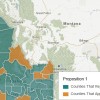Background
This page will no longer be updated. For future coverage this topic go to Boise State Public Radio’s website.
With the results tallied from Idaho’s 967 precincts, voters clearly said no to Propositions 1, 2 and 3.
More than 645,000 votes were cast in each of the Propositions. Each of the propositions failed by at least 15 percent of the vote. Proposition 3, the measure that corresponds to giving each high school student a laptop, failed by the largest margin, with 66 percent of voters rejecting it.
Now that voters have weighed in on the trio of election laws that were passed in 2011, it’s up to lawmakers and stakeholders to determine what happens next.
Background
In 2011 the Idaho Legislature passed a package of three laws which made sweeping changes to the state’s education system.
The laws were introduced and championed by Superintendent of Public Instruction Tom Luna and are known as Students Come First, though opponents call them the Luna Laws.
The laws have been controversial in Idaho, with the state’s largest public teacher union, Democrats and some Republicans condemning them. School administrators and boards have been split on their support. Idaho’s second largest school district in Boise has voiced its opposition to the laws.
The three laws will be split up into Proposition 1, Proposition 2, and Proposition 3. Here’s a breakdown of what each law contains:
Proposition 1
Proposition 1 corresponds to 2011’s Senate Bill 1108 and deals with labor relations. A ‘yes’ vote will keep SB 1108 on the books, a ‘no’ vote will repeal the law. Here are the details:
- District superintendents, school administrators, and teachers get an annual evaluation. At least 50 percent of it must be based on measurable student growth. Teachers’ and principals’ evaluations must include parent input.
- Teachers and school administrators get one or two year contracts. A category of contracts for experienced teachers that renewed automatically from year to year barring misconduct is eliminated. These renewable contracts will stay in place if signed before 2011.
- Steps that had to be taken to fire a teacher or not bring him or her back for the next school year are eliminated such as providing a written statement of the reasons for the decision.
- School districts no longer have to prove a financial emergency before reducing teacher numbers. School boards can reduce teacher numbers at their discretion but cannot consider seniority when deciding who to eliminate.
- Principals can decide which teachers come to their schools.
- Teachers are encouraged but not required to purchase liability insurance and districts must provide information about insurance providers.
- The state’s early retirement incentive program for teachers is eliminated.
- Local education organizations (labor unions) must represent a majority (more than 50 percent) of a district’s teachers in order to engage in collective bargaining. Unions must prove annually that they represent a majority of a district’s teachers.
- Contract negotiations can only cover compensation, defined as salary and benefits. Negotiations must be done in public meetings.
- If a district does not have a union that represents a majority of teachers the school board will set compensation.
- If no contract agreement is reached through collective bargaining by June 10 of each year, the school board will set compensation.
Proposition 2
Proposition 2 corresponds to Senate Bill 1110 and institutes a pay-for-performance plan. A ‘yes’ vote will keep SB 1110 on the books, a ‘no’ vote will repeal the law.
- Bonuses are available for student academic growth measured by statewide standardized tests given each spring. Bonuses would go to all administrators and teachers at a school with a certain amount of improvement in scores.
- All teachers and administrators at a school could get a bonus if the school’s average score on the spring test is in the top 50 percent of schools statewide.
- Local school boards will create systems by which teachers and administrators can get bonuses based on other performance measures such as graduation rates, advanced placement classes taken and parental involvement.
- Teachers can get bonuses for working in hard to fill positions. At least every two years the State Board of Education will determine which positions should be considered ‘hard to fill’ and rank them based on need. Local boards can choose from the state board’s list which positions are hardest to fill in their districts.
- If a district can’t find a qualified teacher for a hard to fill position it can use some of the bonus money to train a teacher for the position.
- A district can designate up to 25 percent of its teachers to get bonuses for working extra hours in leadership roles. Those could include activities like peer mentoring, curriculum development, grant writing and earning a “Master Teacher” designation.
Proposition 3
Proposition 3 corresponds to Senate Bill 1184 and deals with technology and funding. A ‘yes’ vote will keep SB 1184 on the books, a ‘no’ vote will repeal the law.
- A laptop computer will be provided for all high school teachers and students. That will happen over four years beginning with teachers in fall 2012.
- As determined by the Idaho Board of Education, students must take two semester-long online classes to graduate.
- Parents can enroll students in any qualified online course without district permission.
- High schools will get more money to help pay for the costs of providing more math and science classes to meet new graduation requirements.
- SB 1184 Creates a formula for allocating money for technology. That includes mobile computers for high school students, wireless broadband service in high schools, and professional development on using technology in class.
- Creates a formula for allocating money to districts that takes online classes into account.
- Increases the amount districts can spend to get instruction from other districts or provide virtual education.
- The Idaho Department of Education will post a fiscal report card for each school district on its website.
- Each school district must post its annual budget and master labor agreement on its website. That’s in addition to several pieces of financial information districts were already required to post.
- A district can employ fewer teachers than it gets money for (up to 10 percent starting in 2014) without losing the money it gets for the unfilled positions.
- Raises the minimum teacher salary by $355 to $30,000 a year.
- Eliminates a $2,000, five year bonus for “Master Teacher” designation.
- If a student has completed all graduation requirements by the beginning of her senior year the state will pay for her to take up to 36 college credits while still being registered as a high school student. She can also take college credits in her last semester if she meets graduation requirements by the end of the first semester.
- Public post-secondary schools in Idaho can operate charter high schools.
Boise State Public Radio reporter Adam Cotterell contributed.












